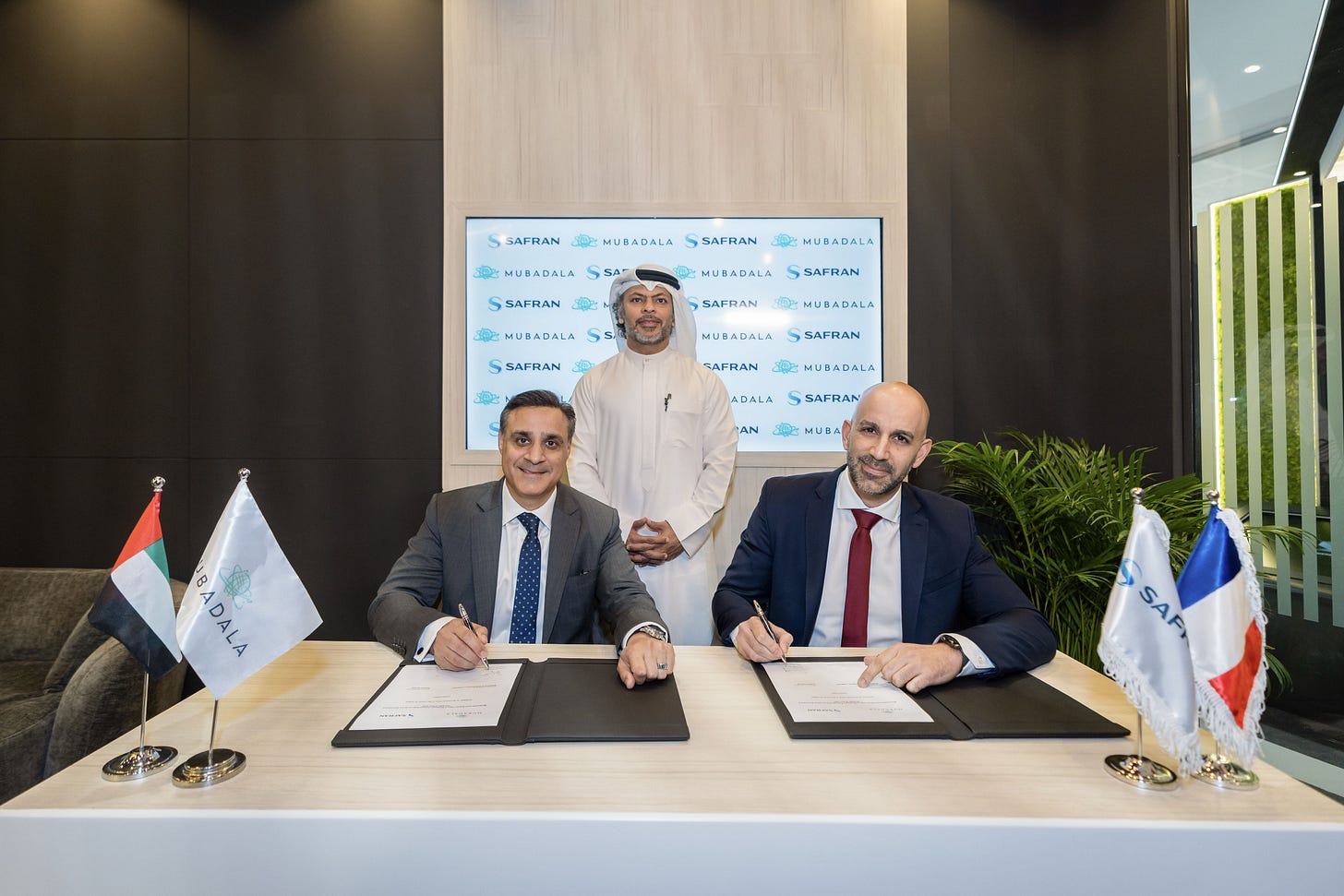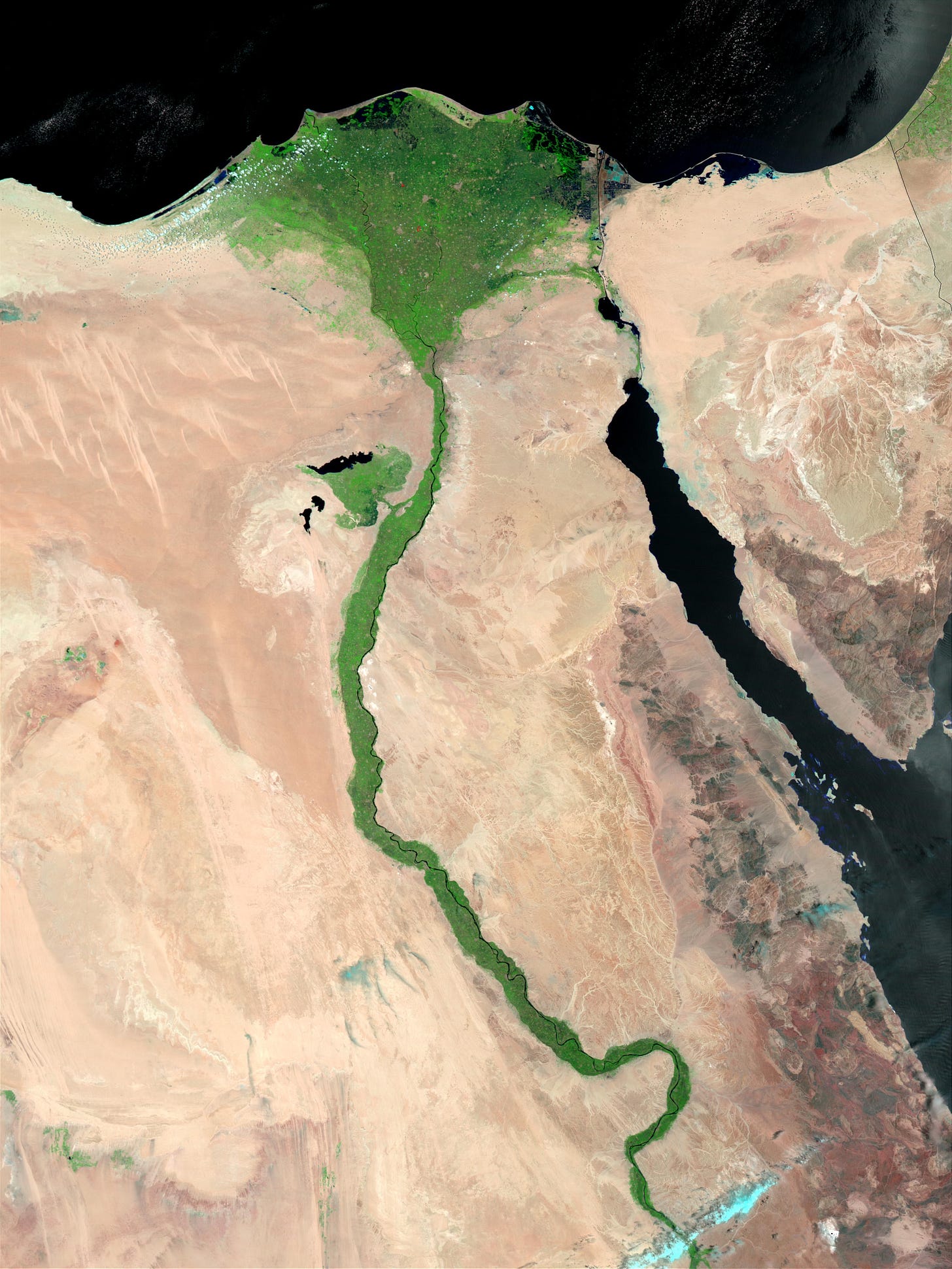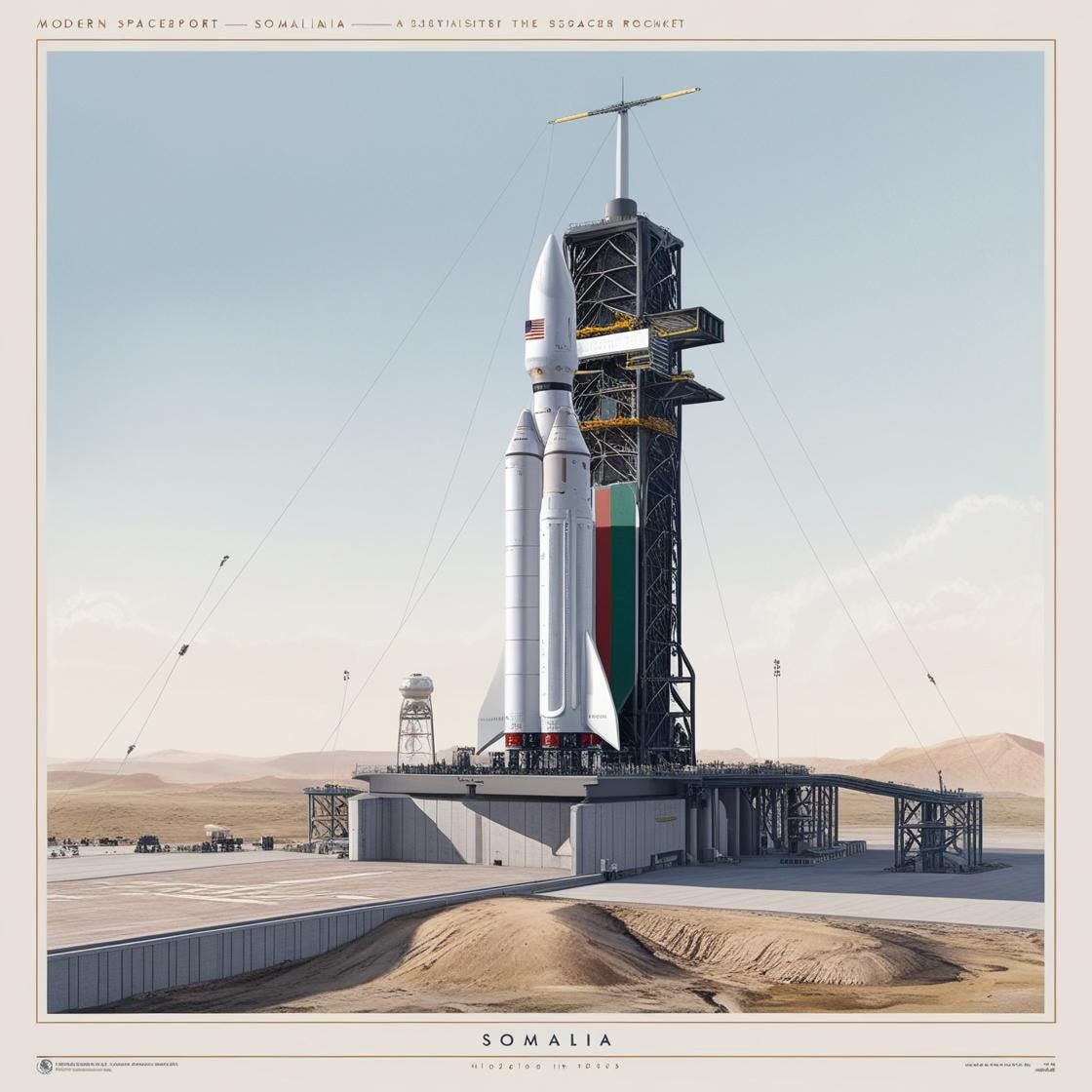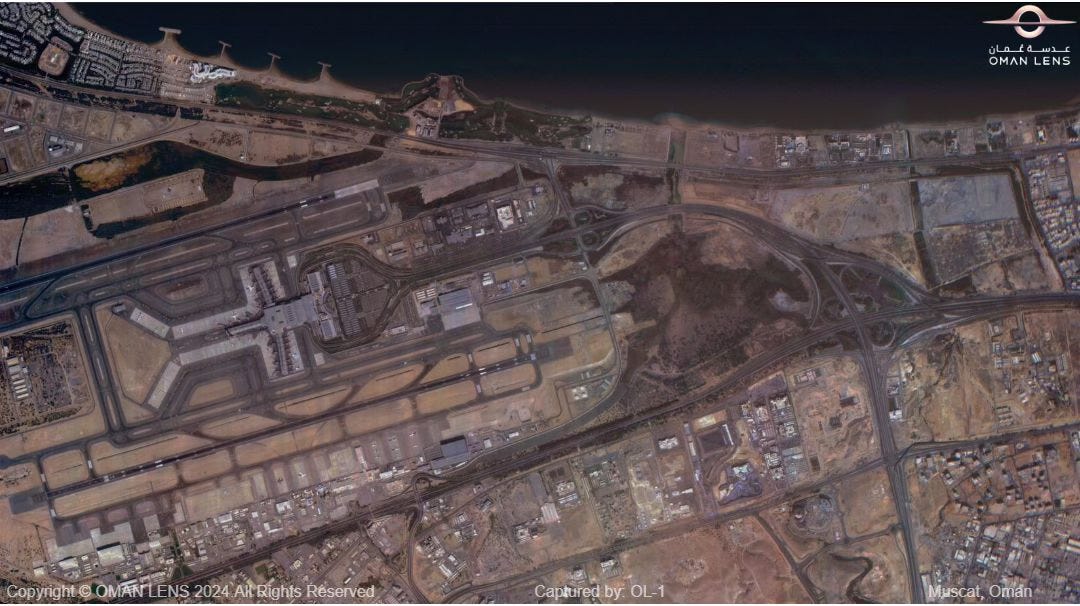Middle East Space Roundup: 19 to 24 November 2024
A summary of all the space news in the Greater Middle East over the past week, brought to you by AzurX

The following are the major space developments in the Greater Middle East region tracked by Middle East Space Monitor over the past week:
UAE Space Developments
Space Perspective Plans to Launch Space Tourism Balloons from UAE
Space Perspective, a company focused on making space travel more affordable, plans to establish a launch site in Dubai, UAE, offering a unique opportunity for passengers to view iconic landmarks like the Burj Khalifa from the edge of space. Utilising a pressurised capsule beneath a hydrogen balloon, the company offers a gentler, slower journey to space, contrasting with traditional rocket-based travel. The experience, priced around AED460,000 (approximately $125,000), includes a six-hour ride with luxury seats, large windows, and in-flight amenities. Space Perspective has generated significant interest, having sold 1,800 tickets and accumulated a $225 million backlog, attracting a diverse range of customers, including middle-class families. The company’s approach aims to make space travel more accessible, and with growing interest from Dubai, Abu Dhabi, and Saudi Arabia, it focuses on expanding operations in the region.
Minister: International Collaboration Key to UAE’s Success in Space
International collaboration has been central to the UAE’s success in advancing its space and technology sectors, a strategy that the country’s top diplomat for advanced science and technology, Omran Sharaf, believes can be emulated by other countries. Sharaf highlighted the importance of joint efforts and capacity building, which have been key in both the UAE’s space and nuclear programmes. This collaborative approach has allowed the UAE to navigate geopolitical complexities, fostering strong partnerships, particularly with the U.S., regardless of changing administrations. As countries face challenges in balancing global tensions, Sharaf emphasised that those who manage these complexities effectively will capitalise on emerging opportunities in science, technology, and economics. Under his leadership, the UAE has made significant strides in space, including the successful Mars Hope Probe mission and ongoing efforts to develop a lunar rover, aiming to address critical issues like food security, water security, and clean energy.
UAE’s Mubadala and France’s Safran Partner to Make Abu Dhabi Space Technology Hub
Mubadala Investment Company and Safran have entered into an expanded strategic partnership to drive aerospace innovation in the UAE, announced at the Abu Dhabi Air Expo. This collaboration focuses on key sectors such as maintenance, manufacturing, human capital development, advanced materials, and space. By leveraging Mubadala's aerospace assets like Strata Manufacturing and Sanad, and Safran's expertise, the partnership aims to enhance capabilities in aircraft structure and engine component manufacturing, as well as advance UAE's position in aerospace materials science. A key component of the agreement is the development of local talent, offering training opportunities for Emirati engineers. The partnership also emphasizes space-related projects, including air traffic management, Earth observation, and propulsion systems, further solidifying Abu Dhabi’s status as a global aerospace hub. This collaboration reflects a commitment to diversifying the UAE’s economy and fostering innovation in high-growth sectors.
UAE’s Space42 Appoints Q Market Makers as Liquidity Provider
Space42, the UAE’s premier space services company that was formed through the merger of Yahsat and Bayanat, has appointed Q Market Makers (QMM) as its liquidity provider to enhance market accessibility and investor engagement. The appointment aims to improve trading volumes, tighten bid-ask spreads, and support price discovery, thus fostering confidence among both institutional and retail investors. With the goal of expanding its investor base and ensuring a dynamic market for its shares, Space42 views this collaboration as a strategic move to strengthen its market position. QMM's role in providing liquidity is expected to contribute to greater market efficiency and transparency, supporting Space42's growth and stability in the ADX-listed shares market.
In Brief: The UAE and Finland held economic talks in Helsinki where space and satellite cooperation was discussed.
Egypt Space News
Egypt’s NARSS to Use, Improve Australia’s Digital Earth Africa Geospatial Platform
Islam Abu Al-Magd, Chairperson of the National Authority for Remote Sensing and Space Sciences (NARSS), met with Axel Wabenhorst, Australia’s Ambassador to Egypt, to explore opportunities for enhanced collaboration in Earth observation data. The discussion centered on Australia's Digital Earth Africa system, which utilises satellite and geospatial data to provide models and insights at a regional level. Both parties explored ways for NARSS to contribute to the system's development, aiming to improve data accuracy and make services more tailored to users’ needs. They agreed to continue their cooperation, exchanging expertise and information, with plans for further technical meetings to align their visions. Minister Ayman Ashour emphasised the importance of fostering cooperation between research bodies and international organisations to exchange knowledge and achieve mutual benefits.
Egypt’s NARSS and Germany’s GIZ Discuss Geospatial Cooperation for Small Agriculture
Islam Abu El-Magd, head of Egypt's National Authority for Remote Sensing and Space Sciences (NARSS), met with Stefan Schmid of the German Agency for International Cooperation (GIZ) and Walid Ramadan to discuss enhancing scientific and research collaboration between their organisations. The meeting focused on leveraging NARSS’s advanced technologies and expertise to support agricultural projects, particularly for small farmers, a key area of interest for GIZ. Abu El-Magd highlighted NARSS’s capacity to contribute to sustainable development through studies that benefit community development and agricultural sustainability. The discussion reinforced NARSS’s commitment to fostering international partnerships that align with local regulations and contribute to Egypt's broader development goals. Minister Ayman Ashour emphasised the importance of such collaborations in advancing research and development across sectors.
Türkiye Space Developments
Türkiye’s President Erdoğan Confirms Intent to Establish Spaceport in Somalia
Türkiye is set to establish a spaceport in Somalia to facilitate missile tests and long-range rocket launches, according to President Recep Tayyip Erdoğan. The decision to build the spaceport in Somalia is driven by its proximity to the equator, which offers significant advantages for rocket launches, including lower fuel requirements and improved payload capacity. This development is part of Türkiye's broader space ambitions, following its recent milestone of sending the first Turkish astronaut to the International Space Station. The spaceport project follows a maritime agreement between Türkiye and Somalia, reflecting strengthened bilateral relations. While the initiative is seen as a significant step forward in Türkiye’s space programme, critics have raised concerns about the allocation of resources to space exploration amid the country's ongoing economic challenges, including high inflation and currency devaluation.
Minister: Türkiye’s Space Economy Advances as Part of Turkish Century Vision
Türkiye is advancing its ambitions in the space economy through a strategic focus on both technological and scientific advancements. Minister of Industry and Technology Mehmet Fatih Kacır outlined Türkiye's growing role in the space sector, emphasising that space technologies now represent significant economic opportunities beyond military and scientific applications. Türkiye has made considerable strides, including the development of its national communication satellite, TURKSAT-6A, positioning it as one of just 11 countries capable of producing such satellites. The country is also focused on expanding its space ecosystem, with a strong foundation in R&D infrastructure and a vision to reach the Moon with a spacecraft powered by domestically developed propulsion systems. These efforts, aligned with the Turkish Century vision, aim to establish Türkiye as a key player in global space sciences, fostering independence in technology and enhancing its competitive power internationally.
Azerbaijan Space News
Azerbaijan’s Azercosmos Hosts Summit of Space Leaders at COP29
The Summit of Space Leaders, hosted by Azerbaijan’s Azercosmos during COP29, focused on the pivotal role of space technology in addressing climate change and fostering global collaboration. The event gathered 80 international representatives, including officials from major space agencies and organisations such as the UN Office for Outer Space Affairs (UNOOSA), Islamic World Educational, Scientific and Cultural Organization (ICESCO), and the International Astronautical Federation (IAF). Discussions centered on the integration of space solutions into climate action, with contributions from countries like Bahrain, Saudi Arabia, the UAE, and several European and Asian countries. Dr. Mohammed Ebrahim Al Aseeri, CEO of Bahrain's National Space Science Agency (NSSA), highlighted Bahrain's initiatives to use space science for environmental monitoring and climate change mitigation. The summit's final statement emphasised the need for strengthened international partnerships and alignment with the UN's 2030 Space Agenda to advance space-based solutions for sustainable climate action.
COP29: Azerbaijan to Support Small Island States with Earth Observation Data to Combat Climate Change
Azercosmos, Azerbaijan’s state space corporation, is prepared to assist small island states by providing geolocation analysis to detect climate change and support emergency response efforts. During a panel at COP29 in Baku, Murad Jamalov, a representative from Azercosmos, discussed the challenges and advancements in utilizing satellite technology for such regions, particularly addressing issues with cloud cover that impacted image quality. Despite initial difficulties, Azercosmos overcame these challenges by leveraging artificial intelligence and cloud computing technologies, allowing them to effectively analyse geospatial data. This capability highlights Azerbaijan's commitment to supporting vulnerable communities with cutting-edge space technologies to address climate-related challenges.
Azerbaijan’s Azercosmos Reports Q3 2024 Satellite Services Revenues
Azerbaijan’s Azercosmos generated $13.9 million in revenue from satellite and telecommunication services between January and September 2024, with 74% of this revenue coming from service exports to 50 countries. In September alone, the company exported services worth $1.5 million to 40 countries, with notable markets including the United Kingdom, Luxembourg, UAE, Pakistan, Türkiye, and Russia. However, the company experienced a decline in overall revenues, which dropped by 25.56% to $19.8 million in 2023, compared to $26.6 million in 2022. Despite this decline, Azercosmos continues to serve high-value international markets, with the UK, Luxembourg, and the UAE contributing significantly to its export earnings.
Oman Space Developments
Oman’s OL-1 AI-Powered Earth Observation Satellite Takes First Images
Oman has made a significant leap in space technology with the successful launch of its first AI-powered Earth observation satellite, OL-1, on 11 November 2024. The satellite, which specialises in remote sensing, marks a milestone in Oman’s space exploration efforts and reflects its commitment to innovation. OL-1, developed locally, features advanced AI capabilities and captured stunning imagery, including a breathtaking view of the aurora from space, shared by Oman Lens on social media. This achievement, timed with Oman’s 54th National Day celebrations, underscores the country's growing presence in space technology and its dedication to contributing valuable global insights.
Oman’s Etlaq Spaceport Prepares for First-Ever Launch in December 2024
Oman is preparing for its first rocket launch from the under-construction Etlaq Spaceport in Duqm, marking a significant step in the country's space ambitions. The spaceport, set to support both scientific and commercial launches, will conduct an experimental vehicle launch in December 2024, with full operations expected by 2030. Oman’s strategic location for equatorial launches positions the spaceport as a key player in the Gulf’s growing space sector, complementing initiatives by the UAE and Saudi Arabia. The spaceport’s development will create high-skilled jobs, attract foreign investment, and bolster Oman’s economy, aligning with its diversification goals away from oil reliance. Additionally, the spaceport’s infrastructure, designed for micro, large orbital, and suborbital craft, will contribute to regional space collaborations and position Oman as an important hub in the global space economy.
Israel Space News
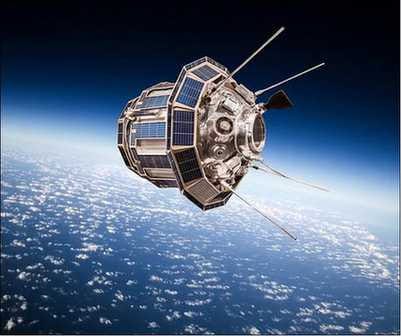
Israel and France Commemorate End of Operations of VENµS Remote Sensing Satellite
The VENµS satellite mission, a successful collaboration between Israel and France, concluded its seven-year operation with significant scientific and technological achievements. The mission, which tested an advanced electric propulsion system developed by Rafael, and employed a multispectral camera by Elbit Systems, provided valuable high-resolution images of over 160 sites daily. These images contributed to environmental research in areas such as agriculture, forestry, and urban planning. The mission's data led to over 100 scientific papers, enhancing decision-making for sustainable resource management. The event, attended by senior officials from both Israel and France, highlighted the success of international collaboration and Israel's commitment to advancing space technology. Looking ahead, Israel Aerospace Industries (IAI) is set to continue its momentum with the development of the ULTRASAT satellite and other ambitious projects.
Israel’s Odysight.ai to Provide High-Performance Cameras for NASA Spacecraft
Odysight.ai, a developer of video-sensor solutions for critical systems based in Israel, is set to integrate its AI-driven predictive maintenance and condition-based monitoring systems into NASA’s future aerospace vehicles. This collaboration, stemming from Odysight’s earlier success with NASA, aims to enhance spacecraft operations by providing real-time monitoring of components during high-speed and extreme conditions. The company's cameras, known for their durability in extreme environments, have previously been installed in the Israel Air Force's aircraft and have withstood the harsh conditions of space during experiments. This partnership marks a significant step in Odysight's transition from medical applications to aerospace, supported by a strong order backlog, including a $16 million contract with NASA and other global aerospace clients. With advancements in AI and predictive analytics, Odysight is positioning itself as a key player in space technology, contributing to enhanced safety and operational efficiency in space missions.
Other Regional Space Developments
Saudi Arabia Officially Launches Centre for Space Futures
The Saudi Space Agency (SSA) has launched the Centre for Space Futures, marking a significant step in the Kingdom's efforts to lead the global space sector. As part of the World Economic Forum's Fourth Industrial Revolution Centres, the centre aims to drive economic development, research, and innovation in space. The centre's board, led by Dr. Mohammed Al Tamimi, Deputy Minister of Economy and Planning, includes prominent figures from global space and economic sectors, such as Eng. Ammar Nagadi, Jeremy Jurgens, and Kam Ghaffarian. Al Tamimi emphasised the centre's role in strengthening Saudi Arabia’s position in space exploration, advancing knowledge, and fostering international collaboration. This initiative supports Saudi Arabia's broader goal of becoming a leader in space innovation, positioning it at the forefront of the evolving space industry.
U.S. House of Representatives Introduces STARS Act to Counter Iran’s Space Threats
Several members of the U.S. House of Representatives have introduced the Space Technology and Regional Security Act (STARS Act), a bipartisan bill aimed at strengthening satellite security and addressing space threats posed by Iran and its affiliates. The bill directs the U.S. Department of Defense to develop a strategy and establish data-sharing agreements with Middle Eastern partners to counter Iranian space activities that could disrupt satellite communications and Global Positioning System (GPS) systems. Iran's increasing space capabilities, including the deployment of military satellites with Russian assistance, raise concerns about the potential for space-based attacks on U.S. and allied interests. The STARS Act is included in the National Defense Authorization Act for fiscal year 2025 and aims to bolster security frameworks in the Middle East through collaboration with regional allies. The bill underscores the importance of protecting communication and navigation systems from emerging threats, with strong support from both U.S. lawmakers and regional partners.
Morocco to License Starlink and OneWeb Satellite Broadband Services in 2025
Morocco is set to become one of the first North African countries to offer satellite internet services from SpaceX’s Starlink and OneWeb, with licenses expected to be issued by the National Telecommunications Regulatory Agency for a 2025 launch. This move aligns with Morocco’s Digital Morocco 2030 initiative, aimed at enhancing digital infrastructure and expanding internet access. The dual licensing of Starlink and OneWeb will introduce competitive satellite broadband options, likely improving service quality and affordability, and supporting Morocco’s ambition to become a leading digital hub in Africa. Enhanced connectivity is expected to drive socio-economic growth, boost digital literacy, and improve access to information across the region.
Algeria’s New Army Chief of Staff to Oversee Algerian Space Technology Requirements
In a strategic reshuffle, Algeria’s President Abdelmadjid Tebboune has appointed Army General Saïd Chanegriha as Minister Delegate to the Minister of National Defence and Chief of Staff of the People’s National Army (ANP), granting him extensive military and political authority. This move underscores Chanegriha’s pivotal role in Algeria’s defence strategy, empowering him to oversee key military decisions, personnel appointments, and international defence agreements, especially in sensitive areas such as weapons systems, telecommunications, and space technologies. With a distinguished military career, including leadership roles in counterterrorism operations during Algeria's "Black Decade," Chanegriha has been instrumental in modernising Algeria’s defence capabilities. His leadership is also marked by contributions to border security, cybersecurity, and the country’s defence industry, aligning with Algeria’s vision for self-reliance. This appointment solidifies the military's integral role in national stability and positions Chanegriha as a central figure in strengthening Algeria’s security and influence on the regional and international stage.
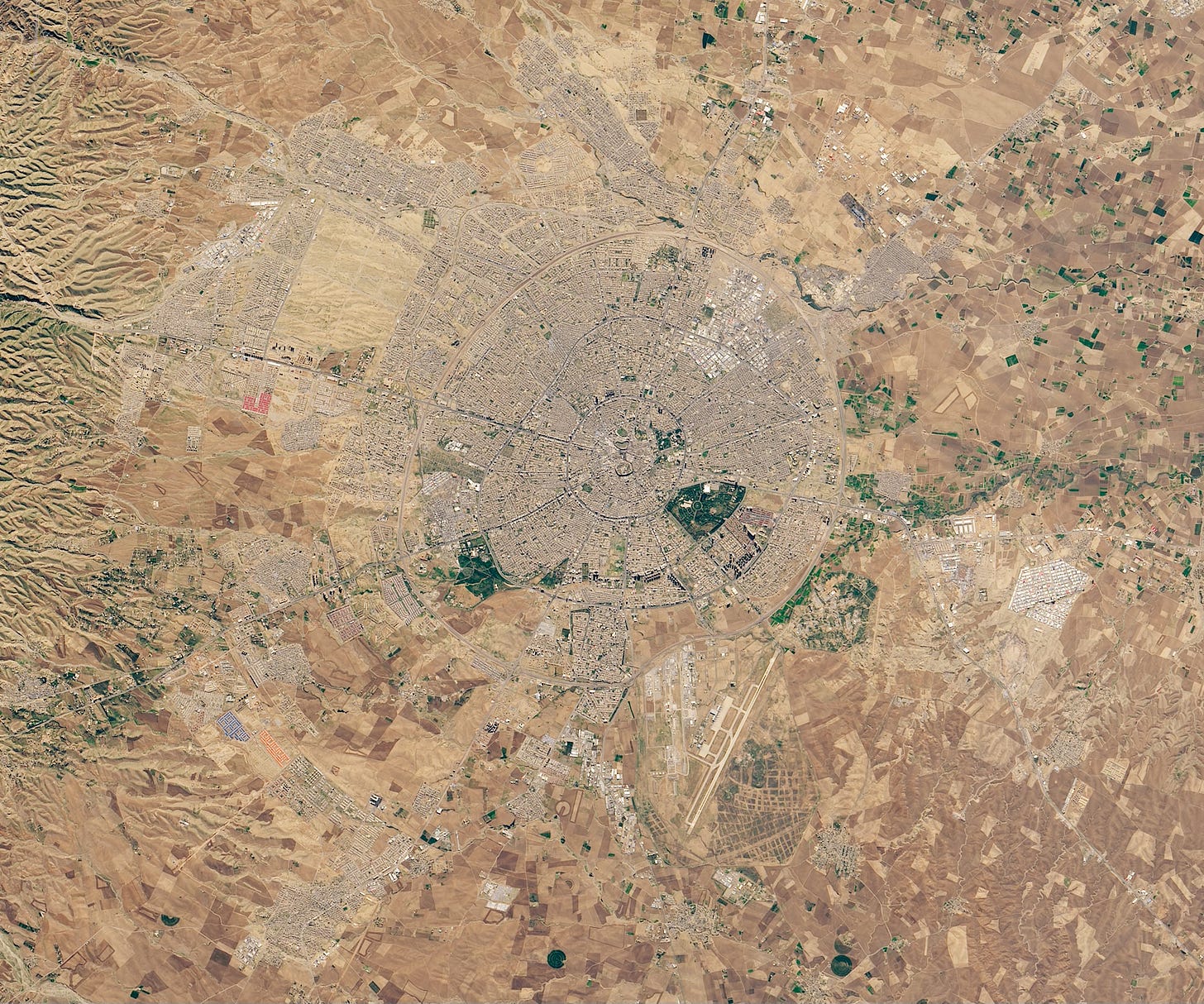
Iraq’s Kurdistan Region Looks to Starlink for Regional Connectivity
Starlink, the satellite-based internet service developed by SpaceX, could offer a crucial solution to potential internet blockades in the Kurdistan Region during regional or political disputes, according to Hiwa Afandi, head of the KRG’s Department of Information Technology. Currently reliant on neighbouring countries for internet connectivity, the Kurdistan Region is vulnerable to disruptions, making satellite internet an essential alternative. While Starlink is not yet available in Iraq or the Kurdistan Region, Afandi has tested its technology, confirming its adequate coverage and ease of installation. The main challenge to widespread adoption lies not in the technical aspects but in obtaining administrative approval from Iraqi authorities. If Starlink were implemented, it could offer a more affordable solution for local residents, with estimated costs between $30-$40 per month.
Bahrain’s NSSA Recognised by UN for Women’s Participation in Space Sector
Bahrain's National Space Science Agency (NSSA) announced that the country topped United Nations indicators for women's participation in the space sector, as highlighted in the Landmark Study on Gender Equality in the Space Sector by the UN's Space for Women programme. The study, presented at the 75th International Astronautical Congress, revealed that Bahrain ranks first in the Asia-Pacific region and third globally for women's representation in public sector space organisations, with significant leadership roles in education, outreach, and administration. The findings underscore Bahrain's commitment to gender equality and women's empowerment, aligning with national policies and the directives of King Hamad bin Isa Al Khalifa. Dr. Mohamed Ibrahim Al Aseeri, CEO of NSSA, emphasised Bahrain's active role in promoting gender parity within the space sector. The country’s progress is further recognised through awards like the 2022 3G Diversity Award and accolades from the International Astronautical Federation.
Armenia and Spain Explore Cooperation in Space Technology and AI
Gevorg Mantashyan, Armenia's First Deputy Minister of High-Tech Industry, met with Ricardo Martínez Vásquez, Spain's newly appointed Ambassador, to explore opportunities for enhancing technological cooperation between the two countries. The discussion highlighted Armenia's ongoing advancements in digitalization, telecommunications, space technologies, and R&D, particularly in semiconductor design and microelectronics. Mantashyan emphasised Armenia's focus on developing a national industry strategy and supporting economic growth through legislative initiatives. The Spanish Ambassador, recognising the importance of the technological sector, shared Spain's achievements in space technology and artificial intelligence, and both parties agreed to deepen bilateral collaboration in these areas, particularly in engineering education and AI.
Italian Think-Tank Publishes Report on Middle East and North African Space Activities
The Italian Institute for International Political Studies (ISPI), a think-tank headquartered in Rome, has released a report titled Mediterranean Bridges: EU-MENA Potential in the New Space Economy. European countries, particularly Italy, are strengthening their collaboration with Middle East and North African countries to tap into the growing space economy. This partnership is driven by initiatives like the Mattei Plan and agreements with Algeria, Egypt, and Gulf states, aiming to enhance innovation and strategic ties in the region. As competition between the U.S. and China for space dominance intensifies, the Mediterranean has emerged as a key strategic hub, positioning the MENA region as a pivotal player. However, the rising potential for investment in the space sector also underscores the need for greater coordination among European actors to avoid conflicts and redundancies. The report highlights the importance of a long-term vision, increased investments, and strong alliances to solidify the Mediterranean's role in the global space economy. The report can be read here.
Be sure to catch up with space activities in the region in the next edition of Middle East Space Monitor’s space roundup!




